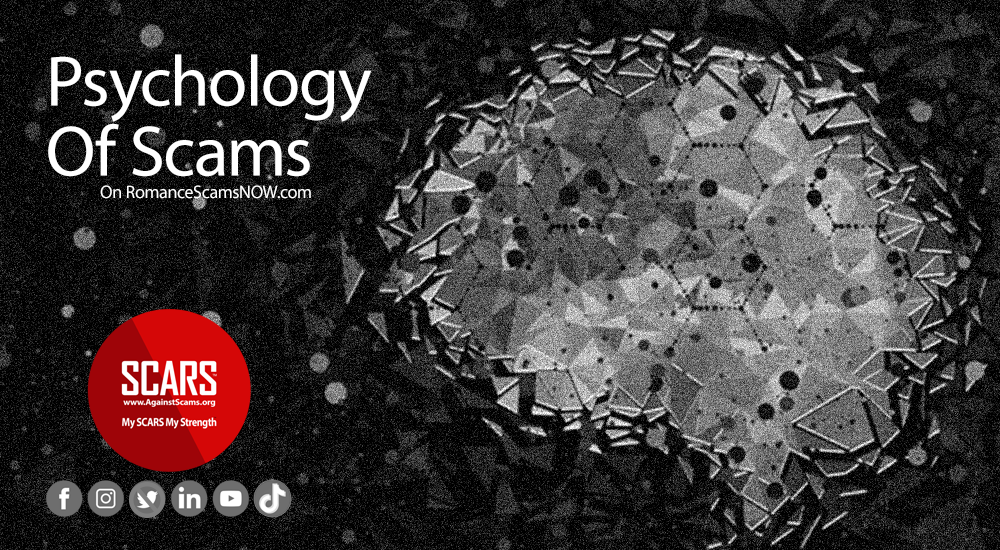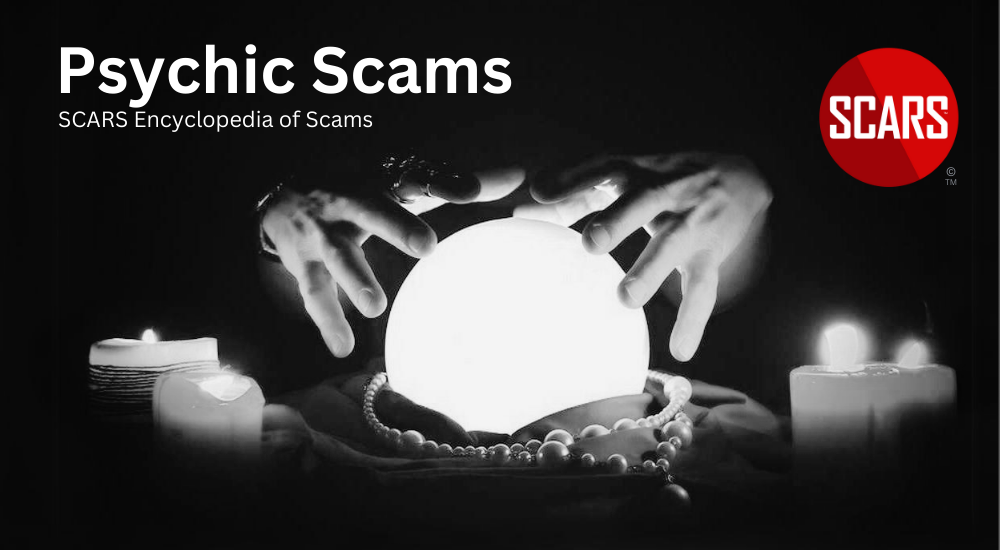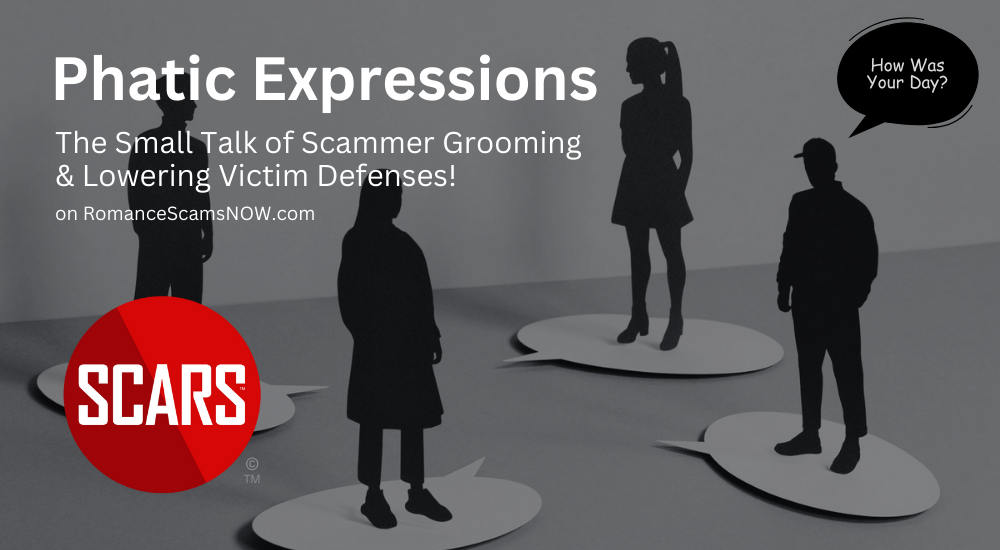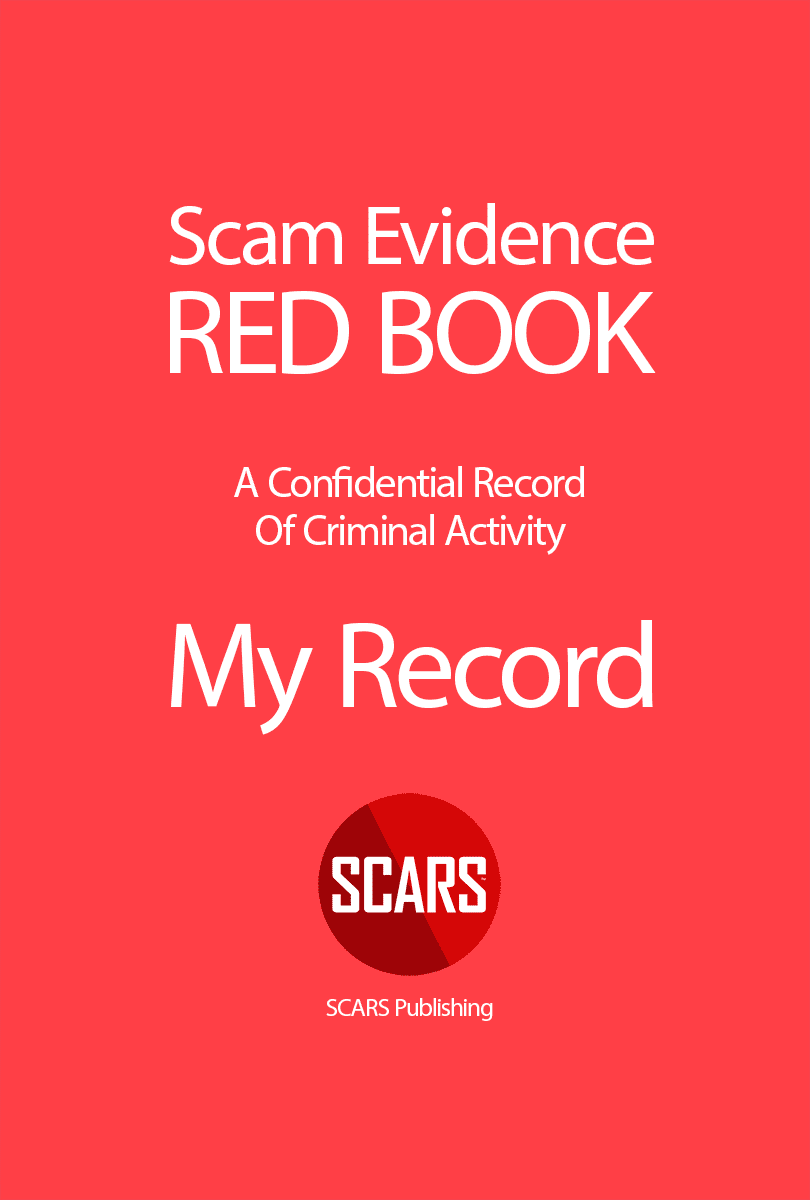Our Human Psychology Enables Us To Be Scammed!
We Are Built To Be Manipulated And Scammers Know How To Do This!
However, the more you know about these psychological processes, the better you are prepared to prevent them and to change your behaviors to avoid them in the future.
Disclaimer: All of these articles are provided for educational & “entertainment” purposes – we have to say that. We are a Crime Victims’ Assistance Provider and do not provide psychological or mental healthcare – we do not offer counseling or therapy services. This information is intended to help you become aware of these topics and find a direction for your own research, or to have topics to discuss and explore with your own mental healthcare professional. These are generalized and may not apply to you.
We will update this catalog from time to time as new articles are added or recategorized.
Why You Were Lured Into The Scam
Victim Predisposition:
- What Drives People To Be Scammed?
- Stranger Trust – How Did You Get Captured In A Scam?
- What Drives Us To Be Scammed
- Sun Tzu And The Selectively Ignorant
- Cognitive Distortions
- White Knight Syndrome – Rescuing Damsels In Distress And Getting Scammed
- The Fear of Missing Out and Romance Scams
- You Made A Mistake
- The Role Curiosity Plays In Being Scammed
How You Were Lured
Social Engineering:
Working Against Yourself:
Grooming
How Scams Work Psychologically:
- Understanding The Long Con – The Basic Mechanics Of A Relationship Scam – How Scams Work
- Scammer Methods – A Scammer’s Primer – Part 1: The Introduction
Grooming:
- Scam Grooming: Finding Common Interests
- Scam Grooming: Using Persuasion To Establish Rapport
- Internet Romance Scammers Know What Their Victims Are Longing To Hear
- Future Faking – Future Planning As A Manipulation Tactic Of Scammers
- Screen Time, Sleep Deprivation, and Romance Scams
- Why Do They Call You Dear?
- Reciprocity Rule & Scams
Manipulation & Control
Control Manipulation:
- The Amygdala Hijack!
- Gaslighting – Destroying A Victim’s Sense Of Reality Or Truth
- What is the Purpose of Gaslighting?
- Diversions – A Scammer’s Manipulative Technique
- Equivocation – The Magician’s Choice – The Arts Of Manipulation
- ASMR – Using Your Brain & Body Against You
- Scam Victim Surrender
- Chasing Your Money – A Psychological Trap
- The 7 Psychological Principles of Scams
- Understanding Yahoo Boy Methods
- Why Scammers Ask For Photos?
- There Is No “He” Or “She” In Romance Scams
- Living under Manipulation for Too Long Leaves Victims …
After-Scam Emotions & Distress
In The Aftermath:
- After The Scam Comes Disaster
- After A Scam, No One Can Tell You How You Will React
- Psychological Shock – After A Scam & In The Future
- Dissociative Amnesia
- Emotional Danger After The Scam
- Disengaging From A Fake Scam Relationship
- 10 Steps To Breaking Free & Beginning Your Recovery
- Support & Information For New Scam Victims
- Understanding A Romance Scam
- What Can You Expect After A Scam
Fear & Panic:
- When Panic Sets In
- How Fear Affects You After A Scam
- Victim Response To Fear Is Anger!
- SCARS Commentary About Helping Victims
- Long Term Fear & Phobias From Scam Victim Trauma
Suicide & Crisis:
Most Recent Psychology of Scams Articles
Grief & Longer Effects
Grief:
Mid to Long Term Emotional Effects:
Guilt Shame Anger & Denial
Guilt, Shame & Self-Blame:
- Guilt vs. Shame – Understanding Them
- Scam Survivor’s Guilt
- Open Letter To A Victim In Pain
- When Should A Scam Victim Feel Ashamed?
Anger, Rage & Hate:
Denial & Help Avoidance:
Scam Victim Trauma
Learning & Coping With Trauma:
- Immediate and Delayed Reactions to Trauma
- Romance Scam Victims & PTSD
- Understanding Trauma Compulsions
- Scam Victims & Traumatic Memories
- Cognitions and Trauma
- Coping Strategies for Scam Victim Trauma Survivors
- Finding Real Trauma Support For Romance Scams Victims
- How Trauma Can Impact Four Types of Memory
- A Candid Discussion Of Trauma And Emotional Hygiene By Guy Winch, Ph.D. – TED Talk
- TEDed Introduction To Post Traumatic Stress Disorder
- Scam Trauma Syndrome [STS]
Victimization
On The Wrong Path
Mistakes Victims Make:
- Scam Victim Information Avoidance
- Survivorship Bias & Romance Scams
- Stages Of A Victim’s Experience Without Support
- Why You Can’t Stop Looking At The Stolen Face
- Good vs. Bad While Recovering
- Victims Are Still Victims
- Scam Obsession – Becoming Scam Junkie
- The Dark Side – Schadenfreude
- Real Victims’ Assistance
- Beware Of Scam Victim Saviors Who Act Like They Are Instant Experts
- Savior Victims
- Obsessive Scammer Exposing
- Scammer Name-Calling – Please Just Stop It!
- The Victim Trap – Meeting Strangers In A Strange Land!
- Victims Frequently Engage In Self-Defeating Behaviors
- Female Face Fixation Syndrome
- Do You Hate Your Scammer?
Recovery & Becoming A Survivor
Recovery & The Path To Becoming A Survivor:
- What Does Recovery Mean For A Scam Victim?
- Jay Shetty on Letting Go!
- Romance Scams Trauma Recovery Tips
- How Do You Get Closure?
- Journaling & Recovery
- How Can You Explain What Happened To Family And Friends?
- Phases Of Recovery
- Getting The Person Back That You Once Were …
- Knowledge Matters To Scam Victims
- Do You Believe In Prophecies?
- Surviving The Change: Scams Turn Lives Upside Down
- Forgiveness
- Resilience, Recovery And Romance Scam Victims
- You Made A Mistake
- What Are The Responsibilities Of A Scam Victim?
Recovery Tools
Recovery Tools:
- Humor As A Tool In Scam Victim Recovery
- Helping Others
- Clothes As Therapy For Scam Victims: When & How Does Enclothed Cognition Work?
- Desensitizing
- Removing The Face Of Your Scammer
- Taking Care Of Yourself
- Write A Letter To Your Scammer – Say What You Feel!
- The Scam Victim’s Mantra
- The Keys to Motivating Yourself After a SCAM!
Returning To Danger
Recidivism & Re-Scamming:
- You Can Still Be Scammed! Over And Over!
- The Odds Of Being Scammed Again
- You Have Been Scammed – So Back To Online Dating
- Repeating The Scam – Engaging In Risky Behavior Over & Over
- Commentary On Being Scammed Again
- Scam Fetishists or Willing Victims?
- Romance Scammer As A Consort
- Sharing Your Scam Story
Scam Victims Families & Friends
Understanding & Support:
- Understanding Scam Victims
- Helping Friends & Family Better Understand Romance Scams
- Intervention For Relatives Of Scam Victims In Total Denial
- How To Confront A Scam Victim In Total Denial
- Protecting Elderly Victims In Denial Over Scams
- Romance Scam Infidelity
- 5 Steps For Rebuilding Trust In A Marriage Following A Romance Scam
- Romance Scams And Risk Of Divorce
- Saving Scammers’ Current Victims
For Impersonation Victims
More Knowledge
Research:
- Research Paper-Report – The psychology of scams: Provoking And Committing Errors Of Judgement
- Research Paper-Report – Risk Factors For Advance Fee Fraud Victimisation
- Online Romance Scams And Victimhood
- Do You Love Me? Psychological Characteristics of Romance Scam Victims
- Psychology Of The Online Dating Romance Scams – A Research Report
If you have an academic or government affiliation you can access more research at ResearchGate
To Learn More Also Look At Our Article Catalogs
Scam & Crime Types
More SCARS
- ScamsNOW Magazine – ScamsNOW.com
- ContraEstafas.org
- ScammerPhotos.com
- AnyScam.com – reporting
- AgainstScams.org – SCARS Corporate Website
- SCARS YouTube Video Channel

















Thank you for all the information is very helpful
Ich wurde Ende 2020 von einem Scammer kontaktiert, der sich “Donald Clifford” nannte und mir Fotos des ehemaligen US-Generals John Robert “Jack” O’Connor schickte. Ich wurde emotional, aber nicht finanziell ausgebeutet. Die Identität des Mannes, in dessen Bilder ich mich verliebt hatte, habe ich erst nach Beendigung des Scams erfahren. Seither melde ich Facebook täglich Fake-Profile des Generals O’Connor, doch Facebook weigert sich, sie zu löschen. Fake-Profile des Generals, die eine Kommentierung zulassen kommentiere ich: “Stop abusing pictures, name and identity of the seven years ago retired Major General John R. O’Connor. Inzwischen haben mich mehrere Frauen aus aller Welt kontaktiert und um Auskunft gebeten: “Ist der General echt? Ist er ein Scam?” Ich gebe meine Infos weiter. Eine der Frauen (aus Brasilien) schickte mir den Screenshot einer Website, auf der ich neben “General O’Connor” abgebildet war und mit ihm gemeinsam zum Chatten einlud! Seither kämpfe ich darum, den Scammern zu untersagen, mein FB-Profilfoto für ihre kriminellen Zwecke zu nutzen und von Facebook zu verlangen, Seiten mit meinem Privatfoto zu löschen. Not easy!
We are sorry this has happened to you. No it is not easy.
We suggest that you use a copyright complaint to have your photos removed from Facebook. Their legal department is more responsive than their moderators.
Do you speak English as well?
Es tut uns leid, dass Ihnen dies passiert ist. Nein, es ist nicht einfach.
Wir empfehlen Ihnen, eine Urheberrechtsbeschwerde einzureichen, um Ihre Fotos von Facebook entfernen zu lassen. Ihre Rechtsabteilung ist reaktionsschneller als ihre Moderatoren.
Sprichst du auch Englisch?